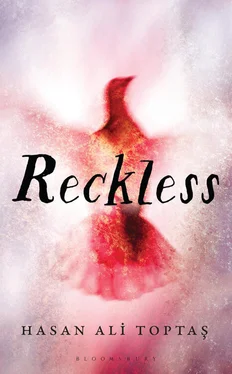Some nights they would sweep the darkness with their searchlights, looking for any smugglers who might have penetrated deep into Turkish territory or any others who might be approaching the border, and sometimes they would turn off all the lights and sit there in the pitch dark, as if lying in ambush. Why they had stopped in that particular place and not elsewhere, and how long they would stay — these were things that only the commander knew, of course. And he never told Ahmet of Polatlı or Ziya. Sometimes he would issue an abrupt command to move forward without putting on the lights, and the jeep would crawl blindly through the night, crackling the dry grass beneath its wheels as it moved towards the next guardhouse. When they were within shooting range, the lights would flash on, as the jeep gathered speed, until pulling up sharply at the guardhouse gate. If the guard on duty was asleep or sitting in front of the phone, chatting with some other guard, it would all end very badly; the commander would beat him until he turned to jelly. Sometimes he’d put the gun to the guard’s temple, his eyes flashing in the night like some madman, and bellowing, ‘I could blow out your brains, you dog and son of a dog, nothing would make me happier, I swear, I could blow your brains out!’
Because Ziya was still responsible for all the work in the office, he was only able to sleep for a few hours after returning from patrol. And like so many of the guards, he was now suffering from rheumatism, and so he did what they all had to do: to reduce the pain he had to make himself sweat, so he wrapped his knees with plastic bags and tied them tightly with string. After just a few hours, he would jump out of bed and quickly get dressed. Without stopping for breakfast, he would rush to the canteen. If Resul was alone in there, he’d say, ‘Pour me a glass of that poison,’ and it was only after downing a few glasses that he was able to calm down.
Sometimes Kenan would join them, slipping into a corner to drink that liquid they called poison, looked very ashamed of himself as he pretended to be drinking tea. With each sip, he’d look out the window at the mud-brick houses and a moment arrived when he could no longer keep himself from talking about the beauties of his own village. And so it was that the Telhamut canteen was cooled by that faraway red-pine forest and its fragrant flowers. And then came the bubbling of the pure waters running down its slender brooks, and the tranquil hills, with their oak trees and their juniper bushes, and the clacking grouse in the ash-coloured undergrowth, and the sheep pens, and the footpaths carpeted with yellow leaves, and the steep cliffs that were red in some lights and grey in others, and the bugs that glistened in the sun amongst those yellowed-headed, pink-headed, purple-headed thorns. And after these would come the vineyards, and the fruit trees, the gorgeous fruit trees, and their perfume, whirling through the air like soap bubbles. And in their wake, the blue skies, each one deeper than the one before, and the grassy slopes, glistening as if they’d just been washed, and those silences, always changing colour. It was Kenan’s face, and the rise and fall of his voice, that lit up each one, if only for an instant. But then that light would go out, and Kenan would go limp, and before their eyes he would turn into a dark and trembling slip of a ghost. After rubbing his knees and giving himself a good scratch and gazing blankly at the empty shelves, this ghost would leave the canteen in silence. And Ziya would head for the office and the typewriter, to prepare more reports on the latest skirmishes.
The company commander would sometimes park himself at the far end of the outpost and watch him from there. He seemed to take pleasure in seeing that the night patrols and the long days at the typewriter were wearing Ziya down, and his eyes sparkled with malice in which Ziya could see the stars on his shoulder reflected. But it must not have been enough, because one day he brought a truckload of pine saplings to the company headquarters. Some were no thicker than two fingers, others no longer than sweet marjoram, and then Ziya had to plant them one pace apart from each other, all along the base of the barbed-wire fence, around the company headquarters and the guard station, and along both sides of the dirt road at the back, while the commander looked on, smiling nastily. The moment he was finished planting, the commander beckoned to him from the window, and when he reached the office, the commander said, ‘You’ll be responsible for watering those saplings. I don’t want to see any dry soil around their bases!’ And as he said this, he didn’t look up once.
‘Yes, sir,’ Ziya said, struggling to mask his confusion.
‘And don’t let me see anyone else doing the watering. Understood?’
‘Yes, sir,’ said Ziya once again.
The commander let a soft smile form beneath his moustache as he shook his head.
And so, as if all the work he already did was not enough, Ziya was now rushing out to the water pump next to the flagpole every other minute to water the saplings. In the beginning a number of others, and most especially Kenan and Resul, took pity on him and offered to help, but Ziya stopped them every time. When they were all gathered together, he even begged them. ‘Friends,’ he’d say. ‘The commander doesn’t want anyone but me tending to the saplings, so please, please don’t water them without my knowing.’ And after that, they never picked up another watering can, of course; they just watched from a distance as Ziya dragged his feet, wearily carting his watering can from tree to tree. After a few days of this, Ziya’s hands were full of water, too: both palms were covered with little blisters.
The blisters had not even healed yet when the commander made a new decision: one evening he strolled in with his parka draped over his shoulders and, stopping in the doorway, his face went sour under the yellow light. ‘From this night on,’ he told Ziya, ‘you are going out on night patrol in my place.’ At which he turned on his heels and headed for the mud-brick houses beyond the barbed-wire fence, and as he looked at them, it seemed to Ziya that each had receded to its own hiding place under cover of darkness. Watching him go, Ziya thought he must be off to empty out the houses and line everyone up next to the well and do a roll-call. But that is not what happened: instead the commander walked softly, very softly, until he disappeared into one of the houses. From that day on, he was forever draping his parka over his shoulders and heading over to that house. He took great care with his appearance after that first time, even; before setting out, he would give himself a close shave, and shine his boots, and put brilliantine on his hair. But the most striking thing about the man crossing through the barbed-wire fence was that he’d become a new man, as soft as the scent of a linden tree. What no one could understand, of course, was how he could go through any of those doors wearing any face at all, after venting his rage on those people, and tying them to flagpoles to beat them up, and lining them up, young and old, next to the well, and peppering them with curses while he did the roll-call. Least of all Resul, who fretted about it for many long days. His theory was that they struggled to make ends meet with the pittance the state paid them, and so opened their doors to the commander out of fear. And when they had opened the door to invite him in, and sat him down on the sofa, and put a few cushions behind his back to make him more comfortable, and offered him a coffee, even — well, they felt obliged to smile, of course, so as not to be rude to their guest, and there was no doubt about it, this was the worst of the man’s tyrannies. For there could be no tyranny on this earth that was worse than making those you had tyrannised smile at you. Those poor people, after smiling like that for a few hours, the whole family would probably feel as tired as if they’d spent the whole day lifting rocks. On the other hand, since this commander could not or would not establish any sort of friendly relations with his men, it followed that he suffered from the isolation that power brings with it, and also he was probably thinking all the time about the home he’d lost, and so here he was, in this godforsaken place, pining away like a kitten in the rain, and longing for a warm hearth. And so even if those people opened their doors out of fear, and smiled at him out of fear, this powerful wretch of a man was going over there for no other reason than to enjoy the warmth of home. And this meant that he, too, was hiding behind false gestures, and if he made those false gestures as if he believed them, then in one sense, he was also tyrannising himself. In other words, it was a heart-wrenching scenario, whichever way you looked at it.
Читать дальше












